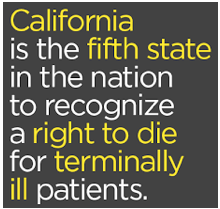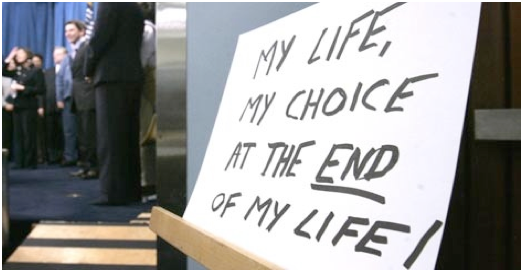CommentsGELFAND’S WORLD--California is joining the states that allow physician assisted suicide. As of June 9, the right to die using legally prescribed pharmaceuticals will be the law. It is, admittedly, a limited sort of access to this form of chemistry, in that being terminally ill is the essential requirement. Society will still try to rescue people whose suicidal thoughts come from psychological turmoil. Still, the passage of this law signals a long term cultural trend.
I'm reminded of a much earlier view of suicide described in Dante's Inferno. Those who take their own lives are condemned to the seventh circle of Hell, where they persist as trees and bushes which are chewed on by the Harpies, each bite causing bleeding and pain. In this 14th century viewpoint, suicide is a terrible sin. God gave us these bodies, and we shouldn't willfully cast them aside.
The religious view of suicide as a sin persisted in the legal structures of many western countries well into the 20th century. Not only was it considered to be a sin, but it was also treated as a crime. The criminal nature of the act was obviously ironic in terms of those who succeeded, but the legal overview reflected on those who assisted suicides and also reflected on treatment of the dead themselves. Consider the way Shakespeare treated Ophelia's burial in Hamlet:
Priest:
Her obsequies have been as far enlarged
As we have warranty: her death was doubtful;
And, but that great command o'ersways the order,
She should in ground unsanctified have lodg'd
Till the last trumpet: for charitable prayers,
Shards, flints and pebbles should be thrown on her;
Yet here she is allow'd her virgin crants,
Her maiden strewments and the bringing home
Of bell and burial.
Laertes:
Must there no more be done?
Priest:
No more be done!
We should profane the service of the dead
To sing a requiem and such rest to her
As to peace-parted souls
Most western countries have abandoned the idea of suicide as a crime in and of itself, although assisting in someone else's suicide has been considered to be a crime in most places. In the United States, it has been considered improper for doctors to take peoples' lives directly. Jack Kevorkian, after all, served 8 years in a Michigan prison after being convicted of second degree murder.
 California now joins Oregon, Washington, Montana, New Mexico, and Vermont in legalizing physician assisted suicide.
California now joins Oregon, Washington, Montana, New Mexico, and Vermont in legalizing physician assisted suicide.
The most striking thing about this law is how little outcry there has been. True, the passage of the law was not without controversy, but it is remarkable how little public interest there was in the process. I would hazard that not many readers of this column found themselves personally engaged on either side.
Californians seem to have taken the attitude that it is up to individuals to decide on their own fates, and the rest of us should not deny them an end should they so choose. That's pretty much what Governor Brown said when he signed the bill into law.
This certainly indicates an evolution in public policy that has resulted from a like evolution in cultural values. In everything from marijuana legalization to legalized abortion to same-sex marriage, our west coast culture has been modifying itself. The addition of physician assisted suicide is one more element in what we might call social laissez faire, or choice, or for lack of a better term, the slightly ironic live and let live.
It's true that there have been outbreaks of permissiveness going back 150 years in this country -- the movement that was once called Free Love and had its own settlements being one of the best examples -- but the acceptance of all these liberal trends by entire states is new. We seem to have figured out how to leave each other to our own values, even when those values include life and death decisions.
The passage and signing of this bill into law also reflects the declining influence of organized religion, particularly that of the Catholic Church. Perhaps this is only the temporary effect of recent scandals, but it also might reflect an increasingly secular population. The rising percentage of those who do not claim any official religious affiliation (the "nones") has been growing, to the point that this group rivals the evangelicals in numbers
The underlying principle here, so hard to communicate to the evangelicals, is that it is possible to have a strong secular morality and to maintain an organized society at the same time.
(Bob Gelfand writes on culture, science, and politics for City Watch. He can be reached at [email protected])
-cw















